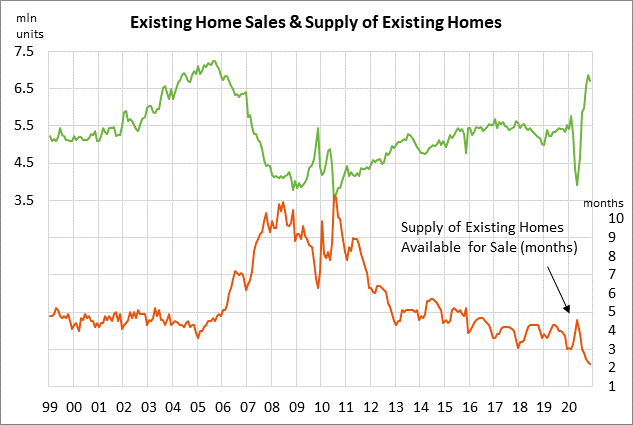- House expected to begin work next week on pandemic aid bill
- Timing of Trump trial remains uncertain
- U.S. Covid infections move lower but deaths so far remain high
- U.S. home sales expected to remain strong
House expected to begin work next week on pandemic aid bill — Speaker Pelosi said yesterday that House committees next week will start putting together the legislation for President Biden’s $1.9 trillion pandemic aid proposal. Ms. Pelosi said that the full House will start considering the bill in early February. The House should be able to easily pass the new pandemic aid bill given their track record of passing large pandemic aid bills last year.
However, the pandemic aid bill will then run into a buzz-saw in the Senate, assuming that the Republican’s filibuster power remains in place in the Senate. The filibuster requires a bill to get 60 votes in favor of a cloture vote to end debate and send the bill to the floor for an up-or-down majority vote.
Minority Leader McConnell on Thursday continued to insist on an agreement to preserve the filibuster as part of the organizing rules that are necessary for the new Senate to operate with the 50-50 tie vote. However, Democratic Senator Dick Durban on Thursday said, “We’re not going to give him what he wishes. If you did that then there would just be unbridled use of it. I mean nothing holding him back.”
Senate Majority Leader Schumer is pushing Mr. McConnell to agree to essentially the same power-sharing agreement that was used in 2001, which did not contain any protection of the filibuster. The delay of a new organizing resolution means that Republicans still have majorities on some Senate committees.
In any case, Democrats don’t have the votes to eliminate the filibuster due to opposition from Democratic Senator Manchin and perhaps one or two other Democratic Senators. That means that Republicans will be able to use their filibuster power to oppose any elements of the Biden pandemic aid plan they don’t like.
President Biden’s top economic advisor, Brian Deese, plans to meet within the next week with the bipartisan group of Senators who were instrumental in producing the last bipartisan pandemic aid bill, according to reporting by Bloomberg.
Democrats could use the budget reconciliation process to pass a new pandemic aid bill, thus bypassing the filibuster and allowing the bill to pass with a majority vote in the Senate. However, that process is not ideal since Democrats would not be able to pass everything they want to with the budget reconciliation process.
In any case, President Biden has said that he will announce his plan in February for a big stimulus bill that includes infrastructure, clean energy spending, and other initiatives. Democrats will almost certainly be forced to use the budget reconciliation process to pass that bill since it would be opposed by Senate Republicans. Democrats might be able to stuff whatever they can’t get in a bipartisan pandemic aid bill into the larger infrastructure and clean energy bill.
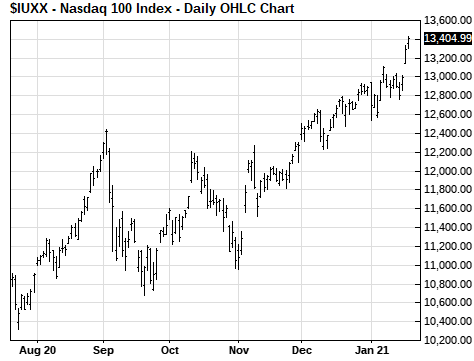
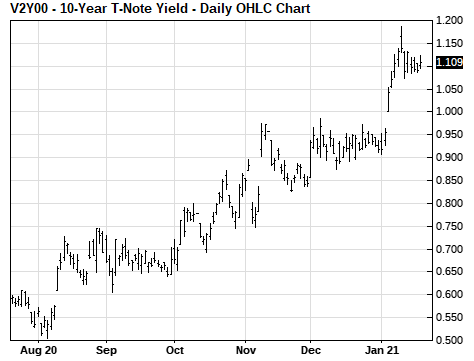
Timing of Trump trial remains uncertain — The Senate will soon be forced to hold the impeachment trial for President Trump, which will disrupt the Senate’s business for approving cabinet officials and working on the pandemic aid bill.
The timing of the trial remains uncertain. Speaker Pelosi said yesterday that she expects to transmit the impeachment article to the Senate “soon,” but she did not give an exact date. The Senate apparently says that it is ready to receive the impeachment article, but the fact remains that Schumer-McConnell have not agreed even on an organization resolution defining committee assignments and various Senate procedures, let alone a procedure for the Trump trial.
In addition, Mr. Trump apparently isn’t ready for trial. Mr. McConnell yesterday proposed that the trial be deferred until early February to give Mr. Trump two weeks to get his legal defense together.
U.S. Covid infections move lower but deaths so far remain high — There has been some good news on the Covid front in the past week, with the 7-day average of new U.S. Covid infections on Thursday falling to a 3-week low of 186,488. However, the level of Covid deaths remains high, with 4,415 deaths on Wednesday, the second-highest ever.
The Biden administration yesterday released its pandemic relief plan, which is focused on encouraging people to wear masks and greatly speed up the pace of vaccinations. Mr. Biden also invoked the Defense Production Act to ramp up testing and increase the supply of vaccine-related materials from private industry.
If there is a seasonal pattern with Covid, as there is with flu, there are hopes that Covid infections may soon peak and move lower into spring, helped even lower by vaccinations. However, the wildcard is the extent to which the more contagious Covid variant might sweep the country and keep the infection rates high.
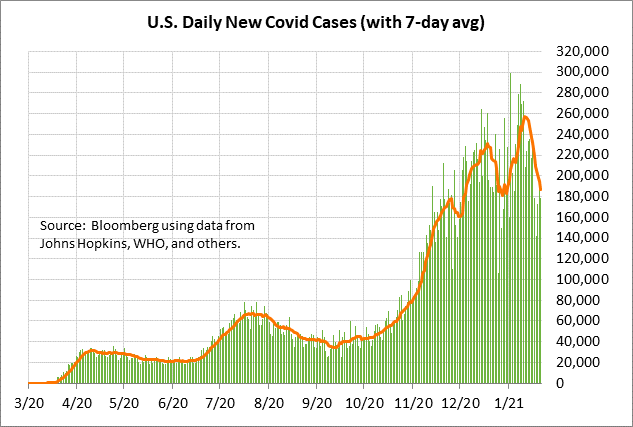
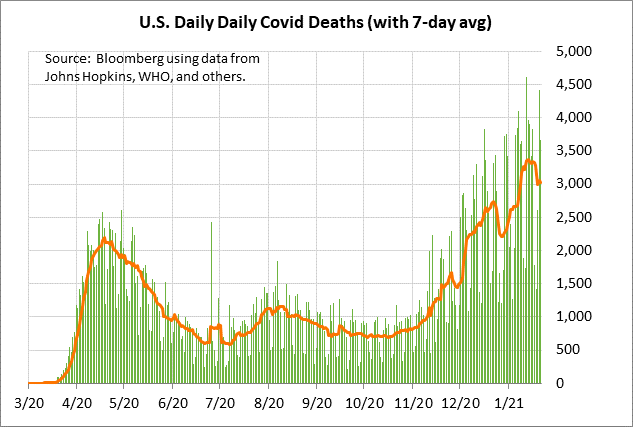
U.S. home sales expected to remain strong — The consensus is for today’s Dec existing home sales report to fall -2.0% to 6.56 million, adding to November’s -2.5% decline to 6.69 million. Even if home sales decline today as expected, the series will still be in very strong shape and just mildly below October’s 15-year high of 6.86 million. Home sales are likely falling because of the fact that there are so few homes available for sale. The supply of existing homes on the market in November fell to a new record low of 2.2 months. Home sales continue to be sparked by pandemic trends and by low mortgage rates. The current 30-year mortgage rate of 2.79% is just mildly above the recent record low of 2.65% posted in early-January.
